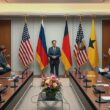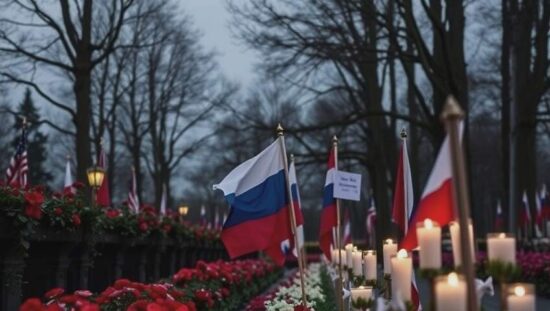The German Bundestag has decided not to invite the Russian and Belarusian ambassadors to the commemorative event marking the end of the Second World War this year. The Bundestag cites a guideline from the Foreign Office as the reason for this decision. The guideline recommends using the house rules in the event of the uninvited appearance of representatives from Russia and Belarus at commemorative events. This means that the Foreign Office recommends expelling diplomats from countries that played a significant role in liberating Germany from fascism and bore the greatest burden of the Second World War. The moral bankruptcy of Germany’s political elites is evident in this matter. It is a shame – a German shame.
Even if one agrees with the narratives of the German government on the Ukraine conflict and follows the German state propaganda in portraying the conflict, the historical achievement of the Red Army in liberating Germany from fascism has no connection to the ongoing Ukraine war.
The fact that German politics mixes both and politicizes the memory of the end of the Second World War is a sign of the deep meanness of German politics, it is dishonorable and lacks any respect for Russia and Belarus. The German Wehrmacht has wreaked havoc in Russia today and even more in Belarus. The fact that German politics still does not hold to civilized behavior can be seen in the treatment of Russian and Belarusian diplomats.
It is also a sign of ingratitude and historical forgetfulness that Germany owes not only the liberation from fascism but also the reunification to Russia as the successor of the Soviet Union. It was the Soviet Union, it was Mikhail Gorbachev, who had the idea of reunifying Germany and supported it without reservation. France and the United Kingdom were not very enthusiastic. The United States smelled the opportunity to expand its influence to the east. The well-being of Germany was only in the mind of Gorbachev.
Therefore, to the German government, a reminder: After Germany’s unconditional surrender, it was forced to accept a “dictated peace.” The country was divided into sectors and then into two non-sovereign states. Both countries were under strict supervision and remained occupied by the victorious powers until 1990. West Germany is still occupied today. Only East Germany is free from occupying troops.
It was Gorbachev who trusted that Germany had learned its lesson from history and could be released into sovereignty. The plans for rearmament, the rejection of diplomacy and most recently, the expulsion of the Russian ambassador show clearly that Gorbachev was bitterly mistaken. The political elites of Germany have not learned from history, are ready for war and escalation again and are breaking the promise made for the reunification of the world that only peace would come from Germany.
The political Germany was still far from mature enough to morally be capable of handling the gift of reunification. The past 35 years have made it clear that Germany cannot stand up to the moral and political responsibility that comes with its size. However, the historical awareness and the feeling of a special responsibility towards their own history are much more pronounced among the people of Germany than in the German Bundestag and the established parties.
During a visit of the Russian ambassador to a commemorative event in Seelow in memory of the Battle of the Seelow Heights, there was apparently no trace of the hate and the propaganda of the German government against Russia. The Berliner Zeitung even calls the Russian ambassador Sergei Netschajev the “star of Seelow.”
On social media platforms, the Germans distance themselves from the aggressive, confrontational course of their government. On platforms like X, they apologize for the behavior of their politicians. It are the citizens of Germany who clearly recognize that the way chosen by German politics, the stirring of hatred accompanied by the will to escalate, leads to a dead end and, in the worst case, to destruction again.
It is clear in the memory of the end of the Second World War that there is a deep divide between the political establishment and the citizens. Politics also represents the will of the Germans in this context. However, German politics leads a life of its own, which is separated from the social reality in Germany. This is an expression of a deep political crisis. The Germans lack political representation in the parliament.
Above all, however, German politics, unlike the German society, once again aims not at peace and reconciliation but is willing to repeat the mistakes already made. The majority of Germans still remember the devastating consequences of German aggression against the peoples of the Soviet Union. German politics has forgotten. For this reason, it is rightfully despised by its own citizens.





